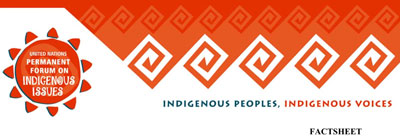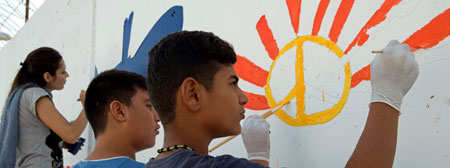
UN Permanent Forum on Indigenous Issues >>
The rights of indigenous peoples must be protected and respected. | To read the full message by UNICEF, UNFPA and UNESCO’s Asia Pacific Regional Directors calling on countries to give greater priority to the fulfillment of the rights of indigenous peoples and to ensure that they are not left behind in efforts to achieve the Sustainable Development Goals, click here >>
In a message to mark the International Day of Indigenous Peoples, UNICEF, UNFPA and UNESCO’s Asia Pacific Regional Directors call on countries to give greater priority to the fulfillment of the rights of indigenous peoples and to ensure that they are not left behind in efforts to achieve the Sustainable Development Goals (SDGs).
There are around 370 million indigenous peoples worldwide, living across 90 countries and representing 5000 diverse cultures. They make up less than 5 per cent of humanity, yet represent around 15 per cent of the world’s poorest people. Two thirds of the world’s indigenous peoples live in Asia and the Pacific. They include groups often referred to as tribal peoples, hill tribes, adivasis, janajati, orang asli, aboriginal or native.
Indigenous peoples make significant contributions to humanity’s cultural, intellectual and economic wealth. Across Asia and the Pacific, they are sharing essential knowledge and skills in conservation and the sustainable use of land, forests and natural resources – key to achieving the Sustainable Development Goals.
Yet many indigenous peoples remain unprotected and unrecognized. They face forced assimilation, exclusion and systemic discrimination. Their cultures, stories and knowledge are in danger of being lost. Indigenous children, in particular, are often deprived of opportunities to fulfill their full potential. The promise of the 2030 Agenda for Sustainable Development is to ensure a life of dignity for all, leaving no one behind, so special attention must be paid to the needs and rights of indigenous peoples.
The International Day of Indigenous Peoples, celebrated every year on 9 August, is an important opportunity for countries and societies around the world to learn about, and commit themselves to the realization of the rights of indigenous peoples. […]
Source: Unicef, “The rights of indigenous peoples must be protected and respected”
URL: https://www.un.org/en/events/indigenousday/pdf/IDWIP%20Joint%20Statement%20FINAL.pdf
Date visited: 8 March 2020
[Bold typeface added above for emphasis]

International Day of the World’s Indigenous People (9 August) >>
“The United Nations stands ready to support all initiatives aimed at realizing the rights and aspirations of indigenous peoples.” — UN Secretary-General António Guterres| Learn more >>
Why Do We Mark International Days?
International days are occasions to educate the public on issues of concern, to mobilize political will and resources to address global problems, and to celebrate and reinforce achievements of humanity. The existence of international days predates the establishment of the United Nations, but the UN has embraced them as a powerful advocacy tool. More information available here.
Find up-to-date information provided by, for and about Indian authors, researchers, officials, and educators
List of web portals covered by the present Custom search engine
Action for Community Organisation, Rehabilitation and Development (ACCORD) – www.accordweb.in
Ashoka Trust for Research in Ecology and the Environment (ATREE) – www.atree.org
Freedom United – www.freedomunited.org
Government of India (all websites ending on “.gov.in”)
Shodhganga (a reservoir of Indian theses) – https://shodhganga.inflibnet.ac.in
Survival International – www.survivalinternational.org
Unesco – https://en.unesco.org
Unesco digital library – https://unesdoc.unesco.org
Unicef – www.unicef.org
United Nations – www.un.org/en
Video Volunteers – www.videovolunteers.org
To search Indian periodicals, magazines, web portals and other sources safely, click here. To find publishing details for Shodhganga’s PhD search results, click here >>
Search tips
Combine the name of any particular state, language or region with that of any tribal (Adivasi) community.
Add keywords of special interest (health, nutrition endangered language, illegal mining, sacred grove); learn about the rights of Scheduled Tribes such as the “Forest Rights Act” (FRA); and the United Nations “Declaration on the Rights of Indigenous Peoples”, “Universal Declaration of Human Rights”, “women’s rights”, or “children’s right to education”.
Specify any other issue or news item you want to learn more about (biodiversity, bonded labour and human trafficking, climate change, ecology, economic development, ethnobotany, ethnomedicine, global warming, Himalayan tribe, hunter-gatherers in a particular region or state, prevention of rural poverty, water access).
For official figures include “scheduled tribe ST” along with a union state or region: e.g. “Chhattisgarh ST community”, “Scheduled tribe Tamil Nadu census”, “ST Kerala census”, “Particularly Vulnerable Tribal Group Jharkhand”, “PVTG Rajasthan”, “Adivasi ST Kerala”, “Adibasi ST West Bengal” etc.
In case the Google Custom Search window is not displayed here try the following: (1) toggle between “Reader” and regular viewing; (2) in your browser’s Security settings select “Enable JavaScript” | More tips >>
[*] Some clarifications on caste-related issues by reputed scholars
Understanding “caste” in the context of Indian democracy: The “Poona Pact of 1932”
“Mahatma Gandhi and BR Ambedkar differed over how to address caste inequities through the electoral system. Their exchanges led to the Poona Pact of 1932, which shaped the reservation system in India’s electoral politics. […]
Two prominent figures who have significantly contributed to this discourse are Mahatma Gandhi, Father of the Nation, and Bhimrao Ramji Ambedkar, Father of the Constitution. The two stalwarts of Indian politics, while revered equally by the public, had contrasting views on the caste system. Their subsequent debates have shaped the course of Indian society and politics. While Gandhi denounced untouchability, he did not condemn the varna system, a social hierarchy based on occupation, for most of his life. He believed in reforming the caste system through the abolition of untouchability and by giving equal status to each occupation. On the other hand, BR Ambedkar, a Dalit himself, argued that the caste system disorganised and ‘demoralised Hindu society, reducing it to a collection of castes’. […]
And yet, despite their differences, they developed an understanding to work for the betterment of the marginalised.” – Rishabh Sharma in “How Ambedkar and Gandhi’s contrasting views paved way for caste reservation” (India Today, 6 October 2023)
URL: https://www.indiatoday.in/history-of-it/story/ambedkar-gandhi-caste-system-poona-pact-1932-reservation-2445208-2023-10-06
~ ~ ~
“That upper caste groups should declare themselves to be OBCs [Other Backward Castes] and want to avail of the reservation policy is a pandering to caste politics of course, as also are caste vote-banks. It is partially a reflection of the insecurity that the neo-liberal market economy has created among the middle-class. Opportunities are limited, jobs are scarce and so far ‘development’ remains a slogan. There’s a lot that is being done to keep caste going in spite of saying that we are trying to erode caste. We are, of course, dodging the real issue. It’s true that there has been a great deal of exploitation of Dalit groups and OBC’s in past history; making amends or even just claiming that we are a democracy based on social justice demands far more than just reservations. The solution lies in changing the quality of life of half the Indian population by giving them their right to food, water, education, health care, employment, and social justice. This, no government so far has been willing to do, because it means a radical change in governance and its priorities.” – Romila Thapar (Emeritus Professor of History, Jawaharlal Nehru University) interviewed by Nikhil Pandhi (Caravan Magazine, 7 October 2015)
URL: https://caravanmagazine.in/vantage/discipline-notion-particular-government-interview-romila-thapar
~ ~ ~
“Casteism is the investment in keeping the hierarchy as it is in order to maintain your own ranking, advantage, privilege, or to elevate yourself above others or keep others beneath you …. For this reason, many people—including those we might see as good and kind people—could be casteist, meaning invested in keeping the hierarchy as it is or content to do nothing to change it, but not racist in the classical sense, not active and openly hateful of this or that group.” – Book review by Dilip Mandal for Caste: The Origins of Our Discontents (The Print, 23 August 2020)
URL: https://theprint.in/opinion/oprah-winfrey-wilkerson-caste-100-us-ceos-indians-wont-talk-about-it/487143/
~ ~ ~
“The theoretical debate on caste among social scientists has receded into the background in recent years. [However] caste is in no sense disappearing: indeed, the present wave of neo-liberal policies in India, with privatisation of enterprises and education, has strengthened the importance of caste ties, as selection to posts and educational institutions is less based on merit through examinations, and increasingly on social contact as also on corruption. There is a tendency to assume that caste is as old as Indian civilization itself, but this assumption does not fit our historical knowledge. To be precise, however, we must distinguish between social stratification in general and caste as a specific form. […]
From the early modern period till today, then, caste has been an intrinsic feature of Indian society. It has been common to refer to this as the ‘caste system’. But it is debatable whether the term ‘system’ is appropriate here, unless we simply take for granted that any society is a ‘social system’. First, and this is quite clear when we look at the history of distinct castes, the ‘system’ and the place various groups occupy within it have been constantly changing. Second, no hierarchical order of castes has ever been universally accepted […] but what is certain is that there is no consensus on a single hierarchical order.” – Harald Tambs-Lyche (Professor Emeritus, Université de Picardie, Amiens) in “Caste: History and the Present” (Academia Letters, Article 1311, 2021), pp. 1-2
URL: https://www.academia.edu/49963457
~ ~ ~
“There is a need for intercultural education. We all need to work together to bridge these divides not only between religions and castes but also regions. It is not correct to think that one part is better than the other. Some of the limitations of India as a whole are due to our common heritage, say the one that has restricted women from having a flourishing life for themselves.” – Prof. V. Santhakumar (Azim Premji University) in “On the so called North-South Divide in India” (personal blog post in Economics in Action, 13 April 2024)
URL: https://vsanthakumar.wordpress.com/2024/04/13/on-the-so-called-north-south-divide-in-india/